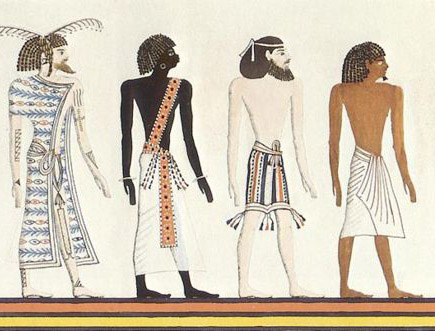Ludendorff on the differences between the races

Ludendorff on the differences between the races.
https://ludendorff.info/menschenrassen-und-es-gibt-sie-doch/
Human races: And yet they do exist!
According to conventional wisdom, races are just a social construct and dividing people into different races is nonsensical. The article printed here examines whether this statement is only politically correct or whether it also corresponds to the facts. The starting point is an evolutionary biology based on the book "Race. The Reality of Human Differences" by anthropologist Vincent Sarich and journalist Frank Miele. This is followed by a comparison with the philosophy of Mathilde Ludendorff.
For speed readers, here is a brief overview of the contents. If you want to go deeper, please refer to the full version:
- Both the legal system of the United States and that of Germany assumes the existence of races.
- The ability to assign people to one's own group or to a group of others is a necessary and normal behavior for a social being. Even children regard race as an intrinsic, immutable aspect of a person's individuality, and they come to this conclusion on their own.
- "Race" was not invented by Europeans in the Age of Discovery to justify colonialism and slavery. In early Egypt, China, India, Greece, and Rome, neighboring races were assigned
not only striking physical traits, but also certain behaviors. The racial division by these cultures took place exactly as the average person today does.
- Sarich and Miele refute the main objections of evolutionary biologists Diamond, Lewontin, and Gould to the existence of races. Lewontin's most important statement, according to which the range of variation within the races is greater than between the races, is recognized as inconsequential and has entered the literature as Lewontin's Fallacy. The well-known biologist Richard Dawkins agrees.
- The fact that human races can be distinguished not only externally, but also at the level of genetic material molecules (DNA), is shown by the use of various DNA analysis methods in the police search for suspects (genetic fingerprinting). A test procedure with 100 genetic markers can determine with 100 percent accuracy the ancestry of a person from Africa, Europe, Asia or America.

- In medicine, it is essential for survival and therefore accepted to study the effectiveness of drugs in the different breeds. "Race-blind medicine kills".
- Breeds also differ in behavior and psychological characteristics. Even newborns of different breeds show striking differences. There are also racial differences in intelligence. However, there is still a need for research in this area.
Taken together, Sarich and Miele use many examples to show that "race" is not a social construct, but a biological reality. From the point of view of evolutionary biology, hereditary differences between geographically separated groups of people are a matter of course, because: If evolution cannot do something, then it is to produce equality! This is not contradicted by the fact that the breeds are difficult to put into biologically clearly definable pigeonholes.
Races from the point of view of Mathilde Ludendorff's knowledge of God:
- Not only biology, but also the philosophy of Mathilde Ludendorff characterizes thinking in evolutionary contexts. So it is hardly surprising that the philosopher Mathilde Ludendorff and the evolutionary biologist Vincent Sarich come to the same conclusion: Of course human races exist!
- According to the philosopher, races and peoples differ in their behavior and, above all, in the way they experience religion and many of the character traits associated with it. In line with this, scientific observation showed that there are also fundamental racial differences in behavior and in
the psychic faculties.
- In addition to the philosophical division into changeable and persistent races, the philosopher makes another, even more important, distinction according to the type of religious experience.
- In their view, the survival of a people is always endangered when the genetic material can no longer harmonize with a species-specific environment, whether due to racial mixing, foreign religions, foreign languages or the loss of valuable traditions.
- According to Mathilde Ludendorff, the value of a person does not depend on his or her race. There are numerous passages in the philosopher's work that clearly prove this. Some of them are listed verbatim in the essay.
- According to Mathilde Ludendorff, the real meaning of the races lies in the diversity of cultural and religious experience. A person's experience of God can be expressed and become an apparition in a work of culture. Culture is a song of God, as she also says. It is infinitely diverse, because every single person has his or her own peculiarity. The diversity of races and peoples additionally enriches this peculiarity by the different types of ethnic peculiarity.

The comparison of scientific and philosophical statements leads to the following conclusion: The biological facts cited offer numerous points of contact with the work of Mathilde Ludendorff. In their tendency, they support essential statements of Ludendorff's knowledge of God, while clearly contradicting the prevailing politically correct ideology.
For the cohesion of peoples and races, the degree of genetic kinship within a community is of great importance.
Beyond the field of natural science, the philosopher's statement leads to the actual meaning of races and peoples. She sees this in the diversity of God-consciousness on earth. This diversity can only be guaranteed if the numerous races and peoples, each with their own cultures, are preserved. Every single people is irreplaceable and therefore has its own value. From the point of view of Mathilde Ludendorff's knowledge of God, all racism, but also all egalitarianism, is to be condemned!
Sources:
Sarich, V. & Miele, F. (2004): Race. The Reality of Human Differences. – Westview Press. 285 pp.



Comments
Post a Comment